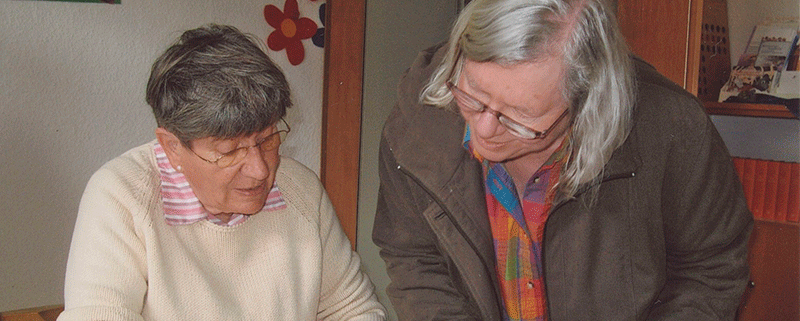by Helen Brinkman
At Lutheran Archives in suburban Adelaide, up to 100 years of stories from Australia’s past are disguised in a largely forgotten handwritten German cursive script known as Kurrentschrift. And, just as archaeologists decipher hieroglyphics, the LCANZ has its own sleuths decoding the amazing stories contained in writings of this ancient German script, to share them with future generations.
Early this year, Australia recognised one of our supersleuths who has spent the past 30 years transcribing and translating Kurrentschrift to reveal its stories.
Dr Lois Zweck’s decades of research were recognised when she was awarded a Medal of the Order of Australia (OAM) for her service to community history in the Australia Day 2022 Honours List.
‘Our local stories can be as dramatic and significant and inspiring as any history anywhere’, says 74-year-old Lois.
The volunteer transcriber, translator and research assistant has been at the forefront of deciphering Kurrentschrift, a feature of many records of early Lutheran history in Australia. ‘Lutheran Archives has 80 to 100 years of records not only in a language few of our people understand, but also in a handwriting even fewer can read’, says Lois. That presents a great challenge for anyone who wants to research the history of their family, their congregation, church, or missions.
That’s where Lois, a member at Bethlehem Lutheran Church in Adelaide, feels so grateful for having acquired the skills that make it possible for her to help researchers access those stories.
‘You get addicted to following stories, to finding the answers … to following the trail and seeing how the stories help you understand what our church is and what it has been in the past’, Lois says.
A Lutheran Archives volunteer since 1992, and a life member of the Friends of Lutheran Archives, Lois is one of about 10 people who can read Kurrentschrift in the Adelaide-based archive. This houses correspondence and minutes in the script, and printed sources from the advent of church papers in the 1860s.
From 1920, English become the official language for synod reports and other official documents, as English began to predominate in church life.
Decades of German language studies and 10 years of formal tertiary study, including a PhD in German Studies and two post-doctoral years in Germany, laid the groundwork for Lois to crack the code of the Kurrentschrift telling the firsthand stories of Australia’s first Lutherans.
But her academic history alone was not enough.
Like her colleagues, she taught herself to read the script in 1988 to translate documents for the centenary history of Adelaide’s Concordia College, using an old textbook with the German alphabet. It went from there.
Her mastery of German also led to her work for two cardinals at the Vatican for 17 years from 2002, translating papers and speeches. She was even presented to Pope John Paul II in St Peter’s Square in Rome.
That’s not bad for a person who was diagnosed with retinitis pigmentosa aged 17, on entering the University of Adelaide, and who later was assessed as legally blind. Her condition means Lois has a small section of central vision (5-10 degrees), instead of up to 180 degrees. Fortunately, that’s all you need to be able to read.
Her love of language has been life-long. Supported by encouraging people, she’s gone further than she ever imagined. ‘I’m enormously grateful to those people for being God’s guiding hand to put me in the place where I am, doing what I enjoy most, in an area where I can best contribute to my community’, Lois says.
Among Lois’s favourite Psalms are Psalm 77 and 78, describing why we need to remember God’s ‘wonderful works’ in the past and tell it to future generations so they too ‘might set their hope in God’. Psalm 77:11 – ‘I will call to mind the deeds of the Lord’, appears on the dedication plaque of the original LCA Archives, where this story began 30 years ago.
The LCANZ’s new churchwide Bishop Paul Smith quoted Psalm 77 in a congratulatory letter to Lois after identifying a Zweck at the bottom of the honours list in the newspaper.
He said that honouring ‘those who have gone before us is a call to continue this work for the sake of those who come after’.
‘You cannot give thanks if you don’t know what you have been given’, Lois says. ‘We have to tell future generations about what God has done for us and those before us.
‘I cannot imagine a better life for myself than the life I have been given.’




